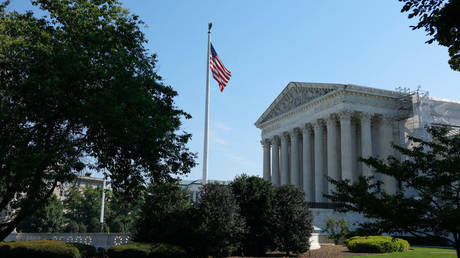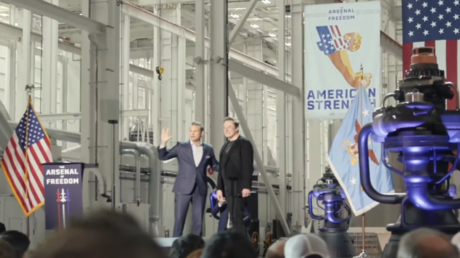
The so-called bump stocks don’t make rifles into machineguns, the justices said
Only Congress has the authority to expand the machine gun ban to “bump stock” devices, the US Supreme Court ruled on Friday, in a firearms rights case technically about bureaucratic overreach.
Bump stocks are an add-on to rifles that allows the shooter to pull the trigger faster and more easily. The Bureau of Alcohol, Tobacco, Firearms and Explosives (ATF) outlawed them in 2018, arguing they de facto turned rifles into machine guns, which have been restricted since 1934.
“We hold that a semiautomatic rifle equipped with a bump stock is not a ‘machine gun’ because it cannot fire more than one shot ‘by a single function of the trigger’,” Justice Clarence Thomas wrote in the majority opinion.
Six justices appointed by Republican presidents sided with the plaintiff, Texas gun shop owner Michael Cargill, over the Department of Justice and Attorney General Merrick Garland, who were defending the ATF action. The three Democrat-appointed justices dissented.
“The horrible shooting spree in Las Vegas in 2017 did not change the statutory text or its meaning,” Justice Samuel Alito wrote in a concurring opinion. “There is a simple remedy for the disparate treatment of bump stocks and machine guns. Congress can amend the law.”
Justice Sonia Sotomayor challenged the majority opinion’s detailed explanation of how firearms and bump stocks work to argue that the ruling “will have deadly consequences.”
“When I see a bird that walks like a duck, swims like a duck, and quacks like a duck, I call that bird a duck,” she read from the bench, in the dissenting opinion joined by Elena Kagan and Ketanji Brown Jackson.
President Joe Biden, a Democrat, condemned the Supreme Court’s decision, as did gun control groups. The New Civil Liberties Alliance, which represented Cargill, applauded the ruling and pointed out that the Constitution has granted legislative powers to Congress, not federal agencies.
The Second Amendment to the US Constitution, dating back to the 18th century, guarantees Americans “the right to keep and bear arms.” The federal government has since repeatedly sought to limit that right.
Citing the crime sprees of mobsters like Al Capone, the National Firearms Act of 1934 outlawed machine guns, defined as anything that could shoot “automatically more than one shot, without manual reloading, by a single function of the trigger.” The Gun Control Act of 1968 expanded that definition to include parts that could convert a firearm into a machine gun.
In October 2017, 58 people were killed and over 850 wounded in a Las Vegas shooting spree. The authorities said that the perpetrator, a gambler by the name of Stephen Paddock, used bump stocks to fire hundreds of rounds from a dozen rifles he brought to his hotel room. Paddock’s motives were never discovered, as he died by suicide, according to the FBI.
President Donald Trump’s administration moved to ban bump stocks in March 2018, in response to outrage over the high school shooting in Parkland, Florida the month before. Although the gunman who killed 17 classmates did not use a bump stock, Trump found himself under pressure to “do something” by Democrats and the media.




